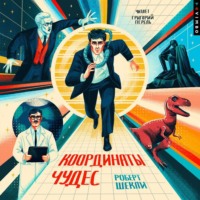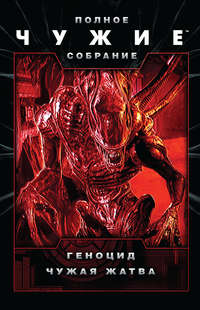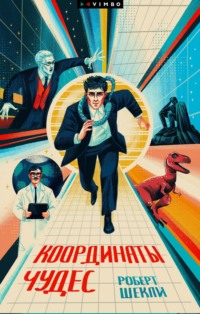
Полная версия
Citizen in Spase. Stories / Гражданин в Космосе. Рассказы. Книга для чтения на английском языке
“I’ll do my best,” Morrison said, and signed off. That afternoon there was an explosion in the fuel dump.
Ten thousand gallons of D-12 were destroyed, and the fuel-dump guard was killed.
“You were pretty lucky,” Morrison said, staring somberly at Lerner.
“I’ll say,” Lerner said, his face still gray and sweat-stained. Quickly he poured himself a drink. “If I had walked through there ten minutes later, I would have been in the soup. That’s too close for comfort.”
“Pretty lucky,” Morrison said thoughtfully.
“Do you know,” Lerner said, “I think the ground was hot when I walked past the dump? It didn’t strike me until now. Could there be some sort of volcanic activity under the surface?”
“No,” Morrison said. “Our geologists have charted every inch of this area. We’re perched on solid granite.”
“Hmm,” Lerner said. “Morrie, I believe you should wipe out the natives.”
“Why do that?”
“They’re the only really uncontrolled factor. Everyone in the camp is watching everyone else. It must be the natives! Psi ability has been proved, you know, and it’s been shown more prevalent in primitives.”
Morrison nodded. “Then you would say that the explosion was caused by poltergeist activity?”
Lerner frowned, watching Morrison’s face. “Why not? It’s worth looking into.”
“And if they can polter,” Morrison went on, “they can do anything else, can’t they? Direct an explosion, lead a convoy astray —[6]”
“I suppose they can, granting the hypothesis.”
“Then what are they fooling around for?” Morrison asked. “If they can do all that, they could blow us off this planet without any trouble.”
“They might have certain limitations,” Lerner said.
“Nuts. Too complicated a theory. It’s much simpler to assume that someone here doesn’t want the job completed. Maybe he’s been offered a million dollars by a rival company. Maybe he’s a crank. But he’d have to be someone who gets around. Someone who checks blast patterns, charts courses, directs work parties —”
“Now just a minute! If you’re implying —”
“I’m not implying a thing,” Morrison said. “And if I’m doing you an injustice, I’m sorry.” He stepped outside the tent and called two workmen. “Lock him up somewhere, and make sure he stays locked up.”
“You’re exceeding your authority,” Lerner said.
“Sure.”
“And you’re wrong. You’re wrong about me, Morrie.”
“In that case, I’m sorry.” He motioned to the men, and they led Lerner out.
Two days later the avalanches began. The geologists didn’t know why. They theorized that repeated demolition might have caused deep flaws in the bedrock, the flaws expanded, and – well, it was anybody’s guess.
Morrison tried grimly to push the work ahead, but the men were beginning to get out of hand. Some of them were babbling about flying objects, fiery hands in the sky, talking animals and sentient machines. They drew a lot of listeners. It was unsafe to walk around the camp after dark. Self-appointed guards shot at anything that moved, and quite a number of things that didn’t.
Morrison was not particularly surprised when, late one night, he found the work camp deserted. He had expected the men to make a move. He sat back in his tent and waited.
After a while Rivera came in and sat down. “Gonna be some trouble,” he said, lighting a cigarette.
“Whose trouble?”
“The natives. The boys are going up to that village.”
Morrison nodded. “What started them?”
Rivera leaned back and exhaled smoke. “You know this crazy Charlie? The guy who’s always praying? Well, he swore he saw one of those natives standing beside his tent. He said the native said, ‘You die, all of you Earthmen die.’ And then the native disappeared.”
“In a cloud of smoke?” Morrison asked.
“Yeah,” Rivera said, grinning. “I think there was a cloud of smoke in it.”
Morrison remembered the man. A perfect hysteric type. A classic case, whose devil spoke conveniently in his own language, and from somewhere near enough to be destroyed.
“Tell me,” Morrison asked, “are they going up there to destroy witches? Or psi supermen?”
Rivera thought it over for a while, then said, “Well, Mr. Morrison, I’d say they don’t much care.”
In the distance they heard a loud, reverberating boom.
“Did they take explosives?” Morrison asked.
“Don’t know. I suppose they did.”
It was ridiculous, he thought. Pure mob behavior. Dengue would grin and say: When in doubt, always kill the shadows. Can’t tell what they’re up to.
But Morrison found that he was glad his men had made the move. Latent psi powers… You could never tell.
Half an hour later, the first men straggled in, walking slowly, not talking to each other.
“Well?” Morrison asked. “Did you get them all?”
“No sir,” a man said. “We didn’t even get near them.”
“What happened?” Morrison asked, feeling a touch of panic.
More of his men arrived. They stood silently, not looking at each other.
“What happened?” Morrison shouted.
“We didn’t even get near them,” a man said. “We got about halfway there. Then there was another landslide.”
“Were any of you hurt?”
“No sir. It didn’t come near us. But it buried their village.”
“That’s bad,” Morrison said softly.
“Yes sir.” The men stood in quiet groups, looking at him.
“What do we do now, sir?”
Morrison shut his eyes tightly for a moment, then said, “Get back to your tents and stand by.”
They melted into the darkness. Rivera looked questioningly at him. Morrison said, “Bring Lerner here.” As soon as Rivera left, he turned to the radio, and began to draw in his outposts.
He had a suspicion that something was coming, so the tornado that burst over the camp half an hour later didn’t take him completely by surprise. He was able to get most of his men into the ships before their tents blew away.
Lerner pushed his way into Morrison’s temporary headquarters in the radio room of the flagship. “What’s up?” he asked.
“I’ll tell you what’s up,” Morrison said. “A range of dead volcanoes ten miles from here are erupting. The weather station reports a tidal wave coming that’ll flood half this continent. We shouldn’t have earthquakes here, but I suppose you felt the first tremor. And that’s only the beginning.”
“But what is it?” Lerner asked. “What’s doing it?”
“Haven’t you got Earth yet?” Morrison asked the radio operator.
“Still trying.”
Rivera burst in. “Just two more sections to go,” he reported.
“When everyone’s on a ship, let me know.”
“What’s going on?” Lerner screamed. “Is this my fault too?”
“I’m sorry about that,” Morrison said.
“Got something,” the radioman said. “Hold on…”
“Morrison!” Lerner screamed. “Tell me!”
“I don’t know how to explain it,” Morrison said. “It’s too big for me. But Dengue could tell you.”
Morrison closed his eyes and imagined Dengue standing in front of him. Dengue was smiling disdainfully, and saying, “Read here the saga of the jellyfish that dreamed it was a god. Upon rising from the ocean beach, the super-jellyfish which called itself Man decided that, because of its convoluted gray brain, it was the superior of all. And having thus decided, the jellyfish slew the fish of the sea and the beasts of the field, slew them prodigiously, to the complete disregard of nature’s intent. And then the jellyfish bored holes in the mountains and pressed heavy cities upon the groaning earth, and hid the green grass under a concrete apron. And then, increasing in numbers past all reason, the spaceborn jellyfish went to other worlds, and there he did destroy mountains, build up plains, shift whole forests, redirect rivers, melt ice caps, mold continents, dig new seas, and in these and other ways did deface the great planets which, next to the stars, are nature’s noblest work. Now nature is old and slow, but very sure. So inevitably there came a time when nature had enough of the presumptuous jellyfish, and his pretension to godhood. And therefore, the time came when a great planet whose skin he pierced rejected him, cast him out, spit him forth. That was the day the jellyfish found, to his amazement, that he had lived all his days in the sufferance of powers past his conception, upon an exact par with the creatures of plain and swamp, no worse than the flowers, no better than the weeds, and that it made no difference to the universe whether he lived or died, and all his vaunted record of works done was no more than the tracks an insect leaves in the sand.”
“What is it?” Lerner begged.
“I think the planet didn’t want us any more,” Morrison said. “I think it had enough.”
“I got Earth!” the radio operator called. “Go ahead, Morrie.”
“Shotwell? Listen, we can’t stick it out,” Morrison said into the receiver. “I’m getting my men out of here while there’s still time. I can’t explain it to you now – I don’t know if I’ll ever be able to —”
“The planet can’t be used at all?” Shotwell asked.
“No. Not a chance. Sir, I hope this doesn’t jeopardize the firm’s standing —”
“Oh, to hell with the firm’s standing,” Mr. Shotwell said. “It’s just that – you don’t know what’s been going on here, Morrison. You know our Gobi project? In ruins, every bit of it. And it’s not just us. I don’t know, I just don’t know. You’ll have to excuse me, I’m not speaking coherently, but ever since Australia sank —”
“What?”
“Yes, sank, sank I tell you. Perhaps we should have suspected something with the hurricanes. But then the earthquakes – but we just don’t know any more.”
“But Mars? Venus? Alpha Centauri?”
“The same everywhere. But we can’t be through, can we, Morrison? I mean, Mankind —”
“Hello, hello,” Morrison called: “What happened?” he asked the operator.
“They conked out,” the operator said. “I’ll try again.”
“Don’t bother,” Morrison said. Just then Rivera dashed in.
“Got every last man on board,” he said. “The ports are sealed. We’re all set to go, Mr. Morrison.”
They were all looking at him. Morrison slumped back in his chair and grinned helplessly.
“We’re all set,” he said. “But where shall we go?”
The Accountant
Mr. Dee was seated in the big armchair, his belt loosened, the evening papers strewn around his knees. Peacefully he smoked his pipe, and considered how wonderful the world was. Today he had sold two amulets and a philter; his wife was bustling around the kitchen, preparing a delicious meal; and his pipe was drawing well. With a sigh of contentment, Mr. Dee yawned and stretched.
Morton, his nine-year-old son, hurried across the living-room, laden down with books.
“How’d school go today?” Mr. Dee called.
“O.K.,” the boy said, slowing down, but still moving toward his room.
“What have you got there?” Mr. Dee asked, gesturing at his son’s tall pile of books.
“Just some more accounting stuff,” Morton said, not looking at his father. He hurried into his room.
Mr. Dee shook his head. Somewhere, the lad had picked up the notion that he wanted to be an accountant. An accountant! True, Morton was quick with figures; but he would have to forget this nonsense. Bigger things were in store for him.
The doorbell rang.
Mr. Dee tightened his belt, hastily stuffed in his shirt and opened the front door. There stood Miss Greeb, his son’s fourth-grade teacher.
“Come in, Miss Greeb,” said Dee. “Can I offer you something?”
“I have no time,” said Miss Greeb. She stood in the doorway, her arms akimbo. With her gray, tangled hair, her thin, long-nosed face and red runny eyes, she looked exactly like a witch. And this was as it should be, for Miss Greeb was a witch.
“I’ve come to speak to you about your son,” she said.
At this moment Mrs. Dee hurried out of the kitchen, wiping her hands on her apron.
“I hope he hasn’t been naughty,” Mrs. Dee said anxiously.
Miss Greeb sniffed ominously. “Today I gave the yearly tests. Your son failed miserably.”
“Oh dear,” Mrs. Dee said. “It’s Spring. Perhaps —”
“Spring has nothing to do with it,” said Miss Greeb. “Last week I assigned the Greater Spells of Cordus, section one. You know how easy they are. He didn’t learn a single one.”
“Hm,” said Mr. Dee succinctly.
“In Biology, he doesn’t have the slightest notion which are the basic conjuring herbs. Not the slightest.”
“This is unthinkable,” said Mr. Dee.
Miss Greeb laughed sourly. “Moreover, he has forgotten all the Secret Alphabet which he learned in third grade. He has forgotten the Protective Formula, forgotten the names of the 99 lesser imps of the Third Circle, forgotten what little he knew of the Geography of Greater Hell. And what’s more, he doesn’t want to learn.”
Mr. and Mrs. Dee looked at each other silently. This was very serious indeed. A certain amount of boyish inattentiveness was allowable; encouraged, even, for it showed spirit. But a child had to learn the basics, if he ever hoped to become a full-fledged wizard.
“I can tell you right here and now,” said Miss Greeb, “if this were the old days, I’d flunk him without another thought. But there are so few of us left.”
Mr. Dee nodded sadly. Witchcraft had been steadily declining over the centuries. The old families died out, or were snatched by demoniac forces, or became scientists. And the fickle public showed no interest whatsoever in the charms and enchantments of ancient days.
Now, only a scattered handful possessed the Old Lore, guarding it, teaching it in places like Miss Greeb’s private school for the children of wizards. It was a heritage, a sacred trust.
“It’s this accounting nonsense,” said Miss Greeb. “I don’t know where he got the notion.” She stared accusingly at Dee. “And I don’t know why it wasn’t nipped in the bud.[7]” Mr. Dee felt his cheeks grow hot.
“But I do know this. As long as Morton has that on his mind, he can’t give his attention to Thaumaturgy.”
Mr. Dee looked away from the witch’s red eyes. It was his fault. He should never have brought home that toy adding machine. And when he first saw Morton playing at double-entry bookkeeping, he should have burned the ledger. But how could he know it would grow into an obsession? Mrs. Dee smoothed out her apron, and said, “Miss Greeb, you know you have our complete confidence. What would you suggest?”
“All I can do I have done,” said Miss Greeb. “The only remaining thing is to call up Boarbas, the Demon of Children. And that, naturally, is up to you.”
“Oh, I don’t think it’s that serious yet,” Mr. Dee said quickly. “Calling up Boarbas is a serious measure.”
“As I said, that’s up to you,” Miss Greeb said. “Call Boarbas or not, as you see fit. As things stand now, your son will never be a wizard.” She turned and started to leave.
“Won’t you stay for a cup of tea?” Mrs. Dee asked hastily.
“No, I must attend a Witch’s Coven in Cincinnati,” said Miss Greeb, and vanished in a puff of orange smoke.
Mr. Dee fanned the smoke with his hands and closed the door. “Phew,” he said. “You’d think she’d use a perfumed brand.”
“She’s old-fashioned,” Mrs. Dee murmured. They stood beside the door in silence. Mr. Dee was just beginning to feel the shock. It was hard to believe that his son, his own flesh and blood, didn’t want to carry on the family tradition. It couldn’t be true!
“After dinner,” Dee said, finally, “I’ll have a man-to-man talk with him. I’m sure we won’t need any demoniac intervention.”
“Good,” Mrs. Dee said. “I’m sure you can make the boy understand.” She smiled, and Dee caught a glimpse of the old witch-light flickering behind her eyes.
“My roast!” Mrs. Dee gasped suddenly, the witch-light dying. She hurried back to her kitchen.
Dinner was a quiet meal. Morton knew that Miss Greeb had been there, and he ate in guilty silence, glancing occasionally at his father. Mr. Dee sliced and served the roast, frowning deeply. Mrs. Dee didn’t even attempt any small talk.
After bolting his dessert, the boy hurried to his room.
“Now we’ll see,” Mr. Dee said to his wife. He finished the last of his coffee, wiped his mouth and stood up. “I am going to reason with him now. Where is my Amulet of Persuasion?”
Mrs. Dee thought deeply for a moment. Then she walked across the room to the bookcase. “Here it is,” she said, lifting it from the pages of a brightly jacketed novel[8]. “I was using it as a marker.”
Mr. Dee slipped the amulet into his pocket, took a deep breath, and entered his son’s room.
Morton was seated at his desk. In front of him was a notebook, scribbled with figures and tiny, precise notations. On his desk were six carefully sharpened pencils, a soap eraser, an abacus and a toy adding machine. His books hung precariously over the edge of the desk; there was Money, by Rimraamer, Bank Accounting Practice, by Johnson and Calhoun, Ellman’s Studies for the CPA[9], and a dozen others.
Mr. Dee pushed aside a mound of clothes and made room for himself on the bed. “How’s it going, son?” he asked, in his kindest voice.
“Fine, Dad,” Morton answered eagerly. “I’m up to chapter four in Basic Accounting, and I answered all the questions —”
“Son,” Dee broke in, speaking very softly, “how about your regular homework?”
Morton looked uncomfortable and scuffed his feet on the floor.
“You know, not many boys have a chance to become wizards in this day and age.”
“Yes sir, I know,” Morton looked away abruptly. In a high, nervous voice he said, “But Dad, I want to be an accountant. I really do, Dad.”
Mr. Dee shook his head. “Morton, there’s always been a wizard in our family. For eighteen hundred years, the Dees have been famous in supernatural circles.”
Morton continued to look out the window and scuff his feet.
“You wouldn’t want to disappoint me, would you, son?” Dee smiled sadly. “You know, anyone can be an accountant. But only a chosen few can master the Black Arts.”
Morton turned away from the window. He picked up a pencil, inspected the point, and began to turn it slowly in his fingers.
“How about it, boy? Won’t you work harder for Miss Greeb?”
Morton shook his head. “I want to be an accountant.” Mr. Dee contained his sudden rush of anger with diffifculty. What was wrong with the Amulet of Persuasion? Could the spell have run down?[10] He should have recharged it. Nevertheless, he went on.
“Morton,” he said in a husky voice, “I’m only a Third Degree Adept, you know. My parents were very poor. They couldn’t send me to The University.”
“I know,” the boy said in a whisper.
“I want you to have all the things I never had. Morton, you can be a First Degree Adept.” He shook his head wistfully. “It’ll be diffifcult. But your mother and I have a little put away[11], and we’ll scrape the rest together somehow.”
Morton was biting his lip and turning the pencil rapidly in his fingers.
“How about it, son? You know, as a First Degree Adept, you won’t have to work in a store. You can be a Direct Agent of The Black One. A Direct Agent! What do you say, boy?”
For a moment, Dee thought his son was moved. Morton’s lips were parted, and there was a suspicious brightness in his eyes. But then the boy glanced at his accounting books, his little abacus, his toy adding machine.
“I’m going to be an accountant,” he said.
“We’ll see!” Mr. Dee shouted, all patience gone. “You will not be an accountant, young man. You will be a wizard. It was good enough for the rest of your family, and by all that’s damnable, it’ll be good enough for you. You haven’t heard the last of this, young man.” And he stormed out of the room.
Immediately, Morton returned to his accounting books.
Mr. and Mrs. Dee sat together on the couch, not talking. Mrs. Dee was busily knitting a wind-cord, but her mind wasn’t on it. Mr. Dee stared moodily at a worn spot on the living-room rug.
Finally, Dee said, “I’ve spoiled him. Boarbas is the only solution.”
“Oh, no,” Mrs. Dee said hastily. “He’s so young.”
“Do you want your son to be an accountant?” Mr. Dee asked bitterly. “Do you want him to grow up scribbling with figures instead of doing The Black One’s important work?”
“Of course not,” said Mrs. Dee. “But Boarbas —”
“I know. I feel like a murderer already.”
They thought for a few moments. Then Mrs. Dee said, “Perhaps his grandfather can do something. He was always fond of the boy.”
“Perhaps he can,” Mr. Dee said thoughtfully. “But I don’t know if we should disturb him. After all, the old gentleman has been dead for three years.”
“I know,” Mrs. Dee said, undoing an incorrect knot in the wind-cord. “But it’s either that or Boarbas.”
Mr. Dee agreed. Unsettling as it would be to Morton’s grandfather, Boarbas was infinitely worse. Immediately, Dee made preparations for calling up his dead father.
He gathered together the henbane, the ground unicorn’s horn, the hemlock, together with a morsel of dragon’s tooth. These he placed on the rug.
“Where’s my wand?” he asked his wife.
“I put it in the bag with your golfsticks,” she told him.
Mr. Dee got his wand and waved it over the ingredients. He muttered the three words of The Unbinding, and called out his father’s name.
Immediately a wisp of smoke arose from the rug.
“Hello, Grandpa Dee,” Mrs. Dee said.
“Dad, I’m sorry to disturb you,” Mr. Dee said. “But my son – your grandson – refuses to become a wizard. He wants to be an – accountant.”
The wisp of smoke trembled, then straightened out and described a character of the Old Language.
“Yes,” Mr. Dee said. “We tried persuasion. The boy is adamant.”
Again the smoke trembled, and formed another character.
“I suppose that’s best,” Mr. Dee said. “If you frighten him out of his wits once and for all, he’ll forget this accounting nonsense. It’s cruel – but it’s better than Boarbas.”
The wisp of smoke nodded, and streamed toward the boy’s room. Mr. and Mrs. Dee sat down on the couch.
The door of Morton’s room was slammed open, as though by a gigantic wind. Morton looked up, frowned, and returned to his books.
The wisp of smoke turned into a winged lion with the tail of a shark. It roared hideously, crouched, snarled, and gathered itself for a spring.
Morton glanced at it, raised both eyebrows, and proceeded to jot down a column of figures.
The lion changed into a three-headed lizard, its flanks reeking horribly of blood. Breathing gusts of fire, the lizard advanced on the boy.
Morton finished adding the column of figures, checked the result on his abacus, and looked at the lizard.
With a screech, the lizard changed into a giant gibbering bat. It fluttered around the boy’s head, moaning and gibbering. Morton grinned, and turned back to his books. Mr. Dee was unable to stand it any longer. “Damn it,” he shouted, “aren’t you scared?”
“Why should I be?” Morton asked. “It’s only grandpa.” Upon the word, the bat dissolved into a plume of smoke. It nodded sadly to Mr. Dee, bowed to Mrs. Dee, and vanished.
“Good-bye, Grandpa,” Morton called. He got up and closed his door.
“That does it,” Mr. Dee said. “The boy is too cocksure of himself. We must call up Boarbas.”
“No!” his wife said.
“What, then?”
“I just don’t know any more,” Mrs. Dee said, on the verge of tears. “You know what Boarbas does to children. They’re never the same afterwards.”
Mr. Dee’s face was hard as granite. “I know. It can’t be helped.”
“He’s so young!” Mrs. Dee wailed. “It – it will be traumatic!”
“If so, we will use all the resources of modern psychology to heal him,” Mr. Dee said soothingly. “He will have the best psychoanalysts money can buy. But the boy must be a wizard!”
“Go ahead then,” Mrs. Dee said, crying openly. “But please don’t ask me to assist you.”
How like a woman, Dee thought. Always turning into jelly at the moment when firmness was indicated. With a heavy heart, he made the preparations for calling up Boarbas, Demon of Children.
First came the intricate sketching of the pentagon, the twelve-pointed star within it, and the endless spiral within that. Then came the herbs and essences; expensive items, but absolutely necessary for the conjuring. Then came the inscribing of the Protective Spell, so that Boarbas might not break loose and destroy them all. Then came the three drops of hippogriff blood —
“Where is my hippogriff blood?” Mr. Dee asked, rummaging through the living-room cabinet.
“In the kitchen, in the aspirin bottle,” Mrs. Dee said, wiping her eyes.











